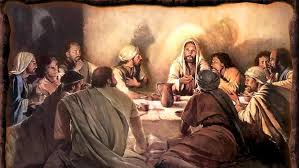Liturgical Readings for : Monday, 16th September, 2024
Monday of Twenty-Fourth Week of Ordinary Time, Year 2
Memorial of Ss Cornelius, pope and Cyprian, bishop, martyrs
FIRST READING
A reading from the first letter of St Paul to the Corinthians 11:17-26.33
Every time you eat this bread and drink this cup, you are proclaiming the Lord’s Supper.
On the subject of instructions, I cannot say that you have done well in holding meetings that do you more harm than good. In the first place, I hear that when you all come together as a community, there are separate factions among you, and I half believe it – since there must no doubt be separate groups among you, to distinguish those who are to be trusted.

The point is, when you hold these meetings, it is not the Lord’s Supper that you are eating, since when the time comes to eat, everyone is in such a hurry to start his own supper that one person goes hungry while another is getting drunk. Surely you have homes for eating and drinking in? Surely you have enough respect for the community of God not to make poor people embarrassed? What am I to say to you? Congratulate you? I cannot congratulate you on this.
For this is what I received from the Lord, and in turn passed on to you: that on the same night that he was betrayed, the Lord Jesus took some bread, and thanked God for it and broke it, and he said,
‘This is my body, which is for you; do this as a memorial of me’.
In the same way he took the cup after supper, and said,
‘This cup is the new covenant in my blood. Whenever you drink it, do this as a memorial of me.‘
Until the Lord comes, therefore, every time you eat this bread and drink this cup, you are proclaiming his death, So to sum up, my dear brothers, when you meet for the Meal, wait for one another.
The Word of the Lord. Thanks be to God
Responsorial Psalm Ps 39
Response Proclaim the death of the Lord until he comes.
1. You do not ask for sacrifice and offerings, but an open ear.
You do not ask for holocaust and victim. Instead, here am I. Response
2. In the scroll of the book it stands written that I should do your will.
My God, I delight in your law in the depth of my heart. Response
3. Your justice I have proclaimed in the great assembly.
My lips I have not sealed; you know it, a Lord. Response
4. O let there be rejoicing and gladness for all who seek you.
Let them ever say: ‘The Lord is great: who love your saving help’. Response
Gospel Acclamation Ps 118: 27
Alleluia, Alleluia!
Make me grasp the way of your precepts, and I will muse on your wonders.
Alleluia !
or Jn 3: 16
Alleluia, Alleluia!
God loved the world so much that he gave his only Son;
everyone who believes in him has eternal life.
Alleluia !
GOSPEL
The Lord be with you. And with your spirit
A reading from the holy Gospel according to Luke 7:1-10 Glory to you, O Lord
Not even in Israel have I found faith like this.
When Jesus had come to the end of all he wanted the people to hear, he went into Capernaum. A centurion there had a servant, a favourite of his, who was sick and near death. Having heard about Jesus he sent some Jewish elders to him to ask him to come and heal his servant. When they came to Jesus they pleaded earnestly with him.
‘He deserves this of you’ they said ‘because he is friendly towards our people;
in fact, he is the one who built the synagogue.‘

So Jesus went with them, and was not very far from the house when the centurion sent word to him by some friends:
‘Sir,’ he said ‘do not put yourself to trouble; because I am not worthy to have you under my roof; and for this same reason I did not presume to come to you myself; but give the word and let my servant be cured.
For I am under authority myself, and have soldiers under me; and I say to one man: Go, and he goes; to another: Come here, and he comes; to my servant: Do this, and he does it.’
When Jesus heard these words he was astonished at him and, turning round, said to the crowd following him,
‘I tell you, not even in Israel have I found faith like this’. .
And when the messengers got back to the house they found the servant in perfect health.
The Gospel of the Lord. Praise to you, Lord Jesus Christ.
********************
Gospel Reflection Monday Twenty Fourth Week in Ordinary Time Luke 7:1-10
I have always been drawn to that first reading from Paul’s first letter to the Corinthians. It is a brief account of the last supper that Paul claims to have received ‘from the Lord’, perhaps meaning from those who were present at the last supper with the Lord. This letter was written about fifteen years before the first gospel (Mark) was written, so it is the earliest account of the last supper that has come down to us. We are in touch here with the very earliest tradition about the Eucharist in the church. There is a link between the gospel reading and the Eucharist also. The words of the response we say together before receiving Holy Communion, ‘Lord, I am not worthy to receive you…’ are, more or less, the words spoken by the Roman centurion to Jesus as Jesus approached his house.
Isn’t it strange that the words of a pagan have become part of the text of our Mass?
According to the gospel reading, Jesus was astonished at the words of this pagan, declaring, ‘Not even in Israel have I found faith like this’. Here was a pagan who didn’t feel worthy enough to have this Jewish man of God come to his house. Yet, Jesus does not ask us to be worthy before coming to us in Holy Communion. He only asks that we be open and receptive to his coming. In the first reading, Paul says, ‘every time you eat this bread and drink this cup, you are proclaiming his (the Lord’s) death’. The Lord’s death, according to Paul, was the demonstration of his love for us, of God’s love for us. ‘God demonstrates his love for us in that while we were still sinners Christ died for us’ (Romans 5:8). When we celebrate the Eucharist, we are proclaiming the Lord’s unconditional love for all and that love becomes present to us in a special way. At every Eucharist, we are invited to receive that love into our lives and then to share it with all whom we meet, so that our lives can proclaim the Lord’s love.
________________________________
The Scripture Readings are taken from The Jerusalem Bible, published 1966 by Darton, Longman & Todd Ltd











